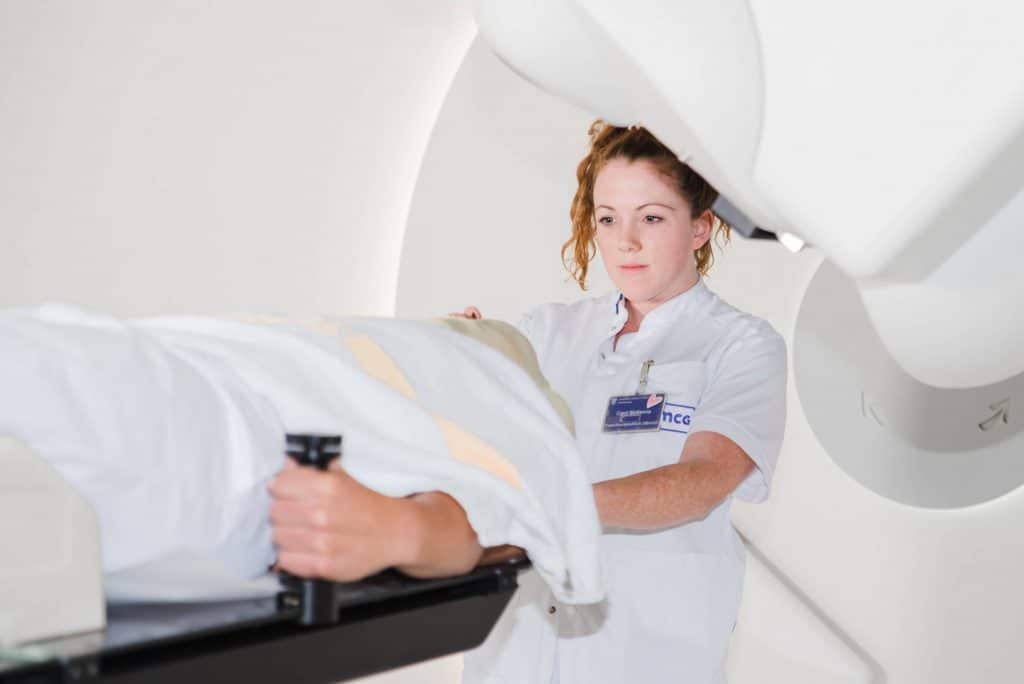Proton Radiography for real-time Intensity Modulated Proton Therapy plan adaptation
Planned secondments: IBA(Belgium), ProtonVDA(USA), QST(Japan).
Project description
Proton therapy can achieve his full potential only when range uncertainty sources, such as the CT calibration curve, setup errors and anatomical changes are precisely managed. Exact knowledge of the relative stopping power (RSP) of the patient tissues is critical to accurately predict the proton range in treatment planning. However, in current clinical practice the SPR prediction is approximated from X-ray computed tomography (CT) and the associated uncertainties require significant safety margins. Proton radiography (PR) potentially may bypass this approximation by directly measuring the RSP, while also detecting patient setup and anatomical variations.
In this project, the researcher will study and develop methods to reduce the (multiple Coulomb scattering) MCS interference for quantitative analysis of PR images obtained by flat panel detectors.
Next, methods to interpret and analyze PR images by applying and extending Neural Network algorithms to reliably extract calibration curve and setup errors from PR images will be developed.
Finally, methods to merge proton and X-ray tomographic data in which PR is employed as a QA tool that provides means of in vivo range verification and ultimately validate CBCT based synthetic CTs to enable the study of real-time plan adaptation workflows will be investigated .
The successful candidate will be enrolled in the Cancer Research Center Groningen (CRCG) Research Institute of the UMCG, under the supervision of Prof. Stefan Both. The UMCG is one of the largest hospitals in the Netherlands. It is a non-profit educational and research organization and part of the University of Groningen (UG).
As part of the CRCG, the ESRs will be embedded in the department of Radiation Oncology, which has a strong track record in the development and validation of prediction models describing the relationship between complex 3D-dose distributions and the risk of radiation-induced side effects. Research activities related to photon as well as to proton therapy are accommodated within GRayLines, an integrated research program including technology development, imaging, clinical studies, radiobiology and HTA. As such, the UMCG provides an ideal environment to merge technological developments with basic, translational and clinical science, and transferable skills.
For more information concerning the research project please contact: Stefan Both.


Giuliano Perotti Bernardini
Early-Stage Researcher at Cancer Research Center Groningen
I am Giuliano Perotti Bernardini, 29 years old, Argentinian, and currently doing a PhD in Medical Physics at the Cancer Research Center Groningen (CRCG) Research Institute of the UMCG, under the supervision of Prof. Dr. Stefan Both. For two years, I was part of the computational dosimetry and treatment planning group of Boron Neutron Capture Therapy (BNCT), of the National Atomic Energy Commission (CNEA) where I obtained a master-equivalent degree in Nuclear Engineering.
I am a curious person who is constantly running after new challenges, and I carry the grit to overcome obstacles and work with passion and perseverance. I enjoy travelling, exploring cities and trying new food. If I have to choose, water is a must in every place, be it a river, a lake, canal or sea, because I like to swim, dive, kayak or just sit around and relax drinking mate tea. And here, in the Netherlands I think I’ve found my place in the world.
My research focuses on Proton Radiography (PR) which is a technique that has the potential to detect and isolate different sources of proton range uncertainty, such as setup errors, CT calibration curve errors, and anatomical changes. In our team we are working to improve this technique with the aim of incorporating it into the clinical treatment workflow to reduce the robust optimisation settings and enable accurate on-line treatment adaptation.
I chose this PhD because since university I have been captivated by medical physics. I took my first steps in neutron research on BNCT and this is an excellent opportunity to work on a cutting-edge proton technique and contribute to the fight against cancer.

University Medical Center Groningen (UMCG)
PROJECT BENEFICIARY
The UMCG is one of the largest academic hospitals in the Netherlands and the first to offer proton therapy. Innovative cancer treatment is one of our key research areas. In the field of Radiation Oncology we focus on high precision, innovation and healthy ageing of cancer survivors.
